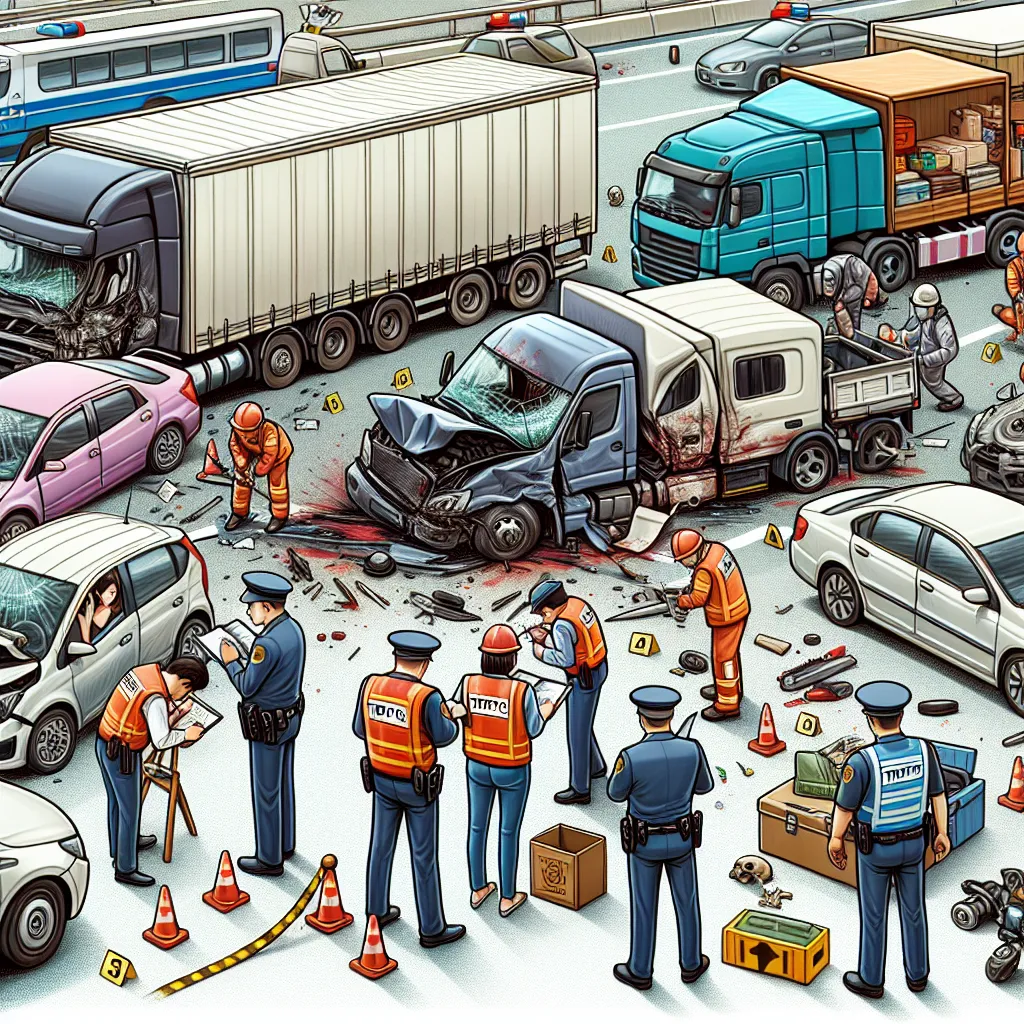Trucking accidents attorneys are more than just legal professionals—they’re often lifelines after life-altering crashes. Most people don’t think twice about sharing the road with 80,000-pound trucks, but when disaster strikes, the aftermath can be overwhelming. Suddenly, terms like “comparative negligence” and “hours-of-service violations” become crucial, and knowing how to navigate this legal maze makes all the difference. If trucking accidents attorneys sound like something only big companies need, let’s break that myth wide open.
What Are Trucking Accidents Attorneys?
Trucking accidents attorneys specialize in helping people who’ve been injured in crashes involving large commercial vehicles. Unlike regular car wrecks, these cases are tangled with federal regulations, multiple liable parties, and insurance companies eager to pay as little as possible. We’re talking about advocates who dig through logbooks, demand black box data, and know which questions keep trucking companies honest. Without their help, victims can be left with medical bills, lost wages, and no clear path forward.
Why Trucking Accidents Attorneys Matter
- Complex Liability: Truck accidents often involve drivers, trucking companies, cargo loaders, and even parts manufacturers.
- Severe Injuries: The damage from a truck crash can be devastating—think spinal cord injuries, amputations, or worse.
- Insurance Challenges: Trucking insurance policies are massive, but insurers fight tooth and nail to protect profits.
- Federal Regulations: Attorneys fluent in both state and federal laws (like FMCSA rules) are critical for success.
Let’s look at the numbers for a moment:
| Year | % of Fatal GA Crashes Involving Trucks | National Avg. |
|---|---|---|
| 2020 | 12% | 9% |
| 2023 | 13% | 10% |
Source: Georgia Department of Transportation
Key Benefits and Drawbacks
Benefits of Hiring Trucking Accidents Attorneys
- Level the playing field: Trucking companies deploy rapid response teams. Attorneys bring their own investigators and experts.
- Maximize Compensation: They know how to value cases, including pain, suffering, and long-term care.
- Handle the Paperwork: From legal filings to insurance negotiations, they keep your claim on track.
- Access to Resources: Medical experts, accident reconstructionists, and data analysts are often needed.
- Emotional Support: They guide families through the storm—sometimes, that’s as important as the money.
Drawbacks
- Legal Fees: Most work on contingency (no win, no fee), but the percentage taken can be significant.
- Time Commitment: Cases can last months or even years if they go to trial.
- Emotional Toll: Reliving the accident details can be draining.
When Does It Make Sense?
- You suffered serious injuries.
- Multiple vehicles or parties were involved.
- The trucking company or their insurer is already contacting you.
- You’re unsure who is at fault or what your rights are.
How Trucking Accidents Attorneys Build a Case
Step-by-Step Approach
- Scene Investigation: Gathering photos, eyewitness accounts, and police reports.
- Black Box Data: Retrieving electronic logs on speed, braking, and driver hours.
- Driver Records: Checking for past violations, fatigue, or improper licensing.
- Maintenance Logs: Looking for skipped inspections or faulty repairs.
- Cargo Inspection: Was the load secure? Overloaded? Hazardous?
- Negotiation or Litigation: Pushing for fair settlements or going to trial if needed.
The Evidence Checklist
| Evidence Type | Why It Matters |
|---|---|
| Police Report | Official fault determination |
| Black Box Data | Proves speed, braking, fatigue |
| Maintenance Records | Shows negligence in upkeep |
| Logbooks | Hours-of-service compliance |
| Eyewitness Statements | Unbiased accident accounts |
| Photos/Videos | Scene reconstruction |
What to Look For in Trucking Accidents Attorneys
Critical Criteria
- Experience: Trucking accident law is a specialty—look for attorneys with a proven track record.
- Board Certification: This signals extra training and expertise.
- Resources: Do they have access to investigators and expert witnesses?
- Trial Willingness: Some lawyers settle everything. Others will actually fight in court.
- Communication: You want updates and clarity, not radio silence.
Red Flags
- Guarantees of specific outcomes
- Pressure to sign immediately
- Lack of transparency about fees
- Poor client reviews (check Google, not just testimonials)
Practical Use Cases
When You Need a Specialist
- Catastrophic Injuries: Severe burns, paralysis, loss of limb—cases where future care is expensive.
- Wrongful Death: When a family member is killed and dependents are left behind.
- Hazardous Cargo Spills: Chemical exposure or environmental lawsuits.
- Multiple Party Collisions: Pileups where blame is hotly contested.
Three Real-World Stories
1. The Night-Shift Nurse
A nurse driving home was rear-ended by a semi. The trucker had been on the road longer than allowed. Her attorney subpoenaed logbooks and black box data, proving the company ignored rest rules. The settlement covered her surgery and lost wages—she called it “a second chance.”
2. The Family Road Trip
A family minivan was sideswiped by a turning delivery truck. The driver claimed the van was in his blind spot, but dashcam footage obtained by the attorney showed the trucker never checked his mirrors. The insurer paid for medical bills and a new vehicle.
3. The Overloaded Logging Truck
A logging truck lost its load on a rural highway, causing a multi-car crash. The attorney traced the logs’ origin to a third-party loader who skipped weight checks. Multiple parties shared blame, and several families received compensation.
How to Evaluate Costs and Features
Cost Structures
- Contingency Fee: Usually 30–40% of the final settlement—no upfront payment.
- Hourly Rate: Rare in these cases, but possible if liability is clear.
- Consultations: The first meeting is almost always free.
Feature Checklist
| Feature | Why It Matters |
|---|---|
| Free Initial Consultation | Risk-free case review |
| 24/7 Availability | Accidents don’t happen on a schedule |
| Local Knowledge | Familiarity with state laws and judges |
| In-House Investigators | Faster, more reliable evidence gathering |
| Board Certification | Extra credibility and training |
Pro Tips
- Ask if the attorney has handled your type of injury before.
- Request examples of past case results (anonymously, of course).
- Check how often cases actually reach trial—settlement-only firms may accept less.
- Trust your gut; if you feel rushed or confused, look elsewhere.
Most-Asked Questions About Trucking Accidents Attorneys
Q1: How soon after a crash should I contact a trucking accidents attorney?
It’s best to call as soon as possible. Evidence disappears quickly, and the trucking company’s team starts working against you right away.
Q2: What if I was partly at fault?
You may still recover damages if your fault is less than 50% (in most states). Your compensation drops by your percentage of fault.
Q3: Does it cost anything to get started?
Nope. Most trucking accidents attorneys offer a free consultation and work on contingency—you only pay if they win.
Q4: How long do these cases usually take?
Anywhere from a few months to over a year, depending on complexity and whether it goes to trial.
Q5: What evidence should I keep?
Photos, medical records, accident reports, and any communication from insurers or the trucking company. If you can, jot down what happened right after the crash.
Q6: Can I settle without an attorney?
You can, but you’re likely to receive much less. Trucking companies have teams trained to minimize payouts.
Q7: What makes trucking accident cases different from car accidents?
More severe injuries, complicated laws, and multiple potential defendants—plus, federal regulations come into play.
Getting the right trucking accidents attorneys involved after a crash isn’t just smart—it can be life-changing. With the right advocate, victims don’t have to fight alone or settle for less than they truly need to rebuild.
Frequently Asked Questions About Trucking Accidents Attorneys
When should I contact a trucking accidents attorney after a crash?
It’s best to call as soon as possible because evidence can disappear quickly, and trucking companies start working against you right away.
Can I still recover damages if I was partly at fault in a trucking accident?
Yes, you can still recover damages if your fault is less than 50% in most states, but your total compensation will be reduced by your percentage of fault.
Does hiring a trucking accidents attorney cost anything upfront?
No, most attorneys offer a free initial consultation and work on a contingency fee basis, meaning you only pay if they win your case.

